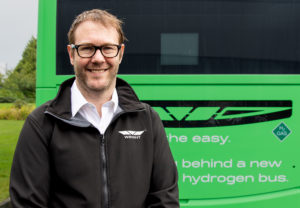Why is Wrightbus agnostic when it comes to the question of Battery Electric versus Hydrogen bus technology?
We believe that there is no single solution and that future fleets will be a blend of technologies. Clearly both BEV and FCEV have a huge part to play in the decarbonisation of public transport. For urban routes, battery electric buses are ideal, but for longer duties or routes that operate longer hours, hydrogen comes into play. With hydrogen, operators have the same level of operational freedom that they are used to with diesel buses.
What help and assistance can Wrightbus provide bus operators when making the switch to zero emission vehicles?
The shift to new energy powertrains and the associated changes to business models can be very daunting to operators. This really boils down to how can they change to zero emission buses but still meet the demands of their customers and continue to be profitable? To this end, we work closely with our customers to understand how they intend to use our vehicles.
We have a comprehensive modelling tool, developed over the past 20 years in partnership with Queen’s University Belfast, that can accurately predict both range and total cost of ownership specific to each customer’s requirements.
How important is Government ZEBRA funding when it comes to the uptake of zero emission buses?
The ZEBRA scheme is an excellent initiative which has done a lot of good, but more is still required here. The process needs to be quicker. Government should be looking to speed up the delivery of the ZEBRA bus orders which have already been allocated. On top of that, there is money remaining in this year’s Spending Review to help local authorities deliver zero emission buses.
Operators and local authorities need to know that they can continue to transition to zero emission vehicles and sustain their business without dropping vital services. In order to do that, they need to be assured that the funding will continue after ZEBRA. This is also needed by the manufacturers so that they can scale up to meet the country’s decarbonisation objectives.
Can you tell us more about your plans for a green hydrogen production facility at the Ballymena factory in partnership with Hygen Energy?
We are working with Hygen and Ryze on an innovative multi-million pound clean hydrogen production facility at our headquarters in Ballymena – a flagship project for Northern Ireland and strategically important for the UK as a whole. The project will initially be able to produce enough hydrogen to run up to 300 buses, and has the potential to triple in scale as demand for hydrogen increases.
It will create economic opportunities in Northern Ireland while supporting decarbonisation efforts and contributing to the UK government’s targets for domestic renewable hydrogen production capacity.
What export plans does Wrightbus have beyond the UK and Ireland market?
Wrightbus has received orders for more than 100 hydrogen vehicles in Germany with deliveries starting towards the end of this year. We are also very active in discussions with numerous operators across Europe. This has only been possible due to our strong reputation for hydrogen vehicles and our new single-deck platform, which is the first in the UK to have a low floor from the front to the back – making it very suitable for the European marketplace.
Wrightbus has historically sold vehicles round the world, with key markets including Hong Kong and Singapore. We are currently working closely with our customers there to launch vehicles in both markets next year.
Robert Best, Director of Engineering, Wrightbus









